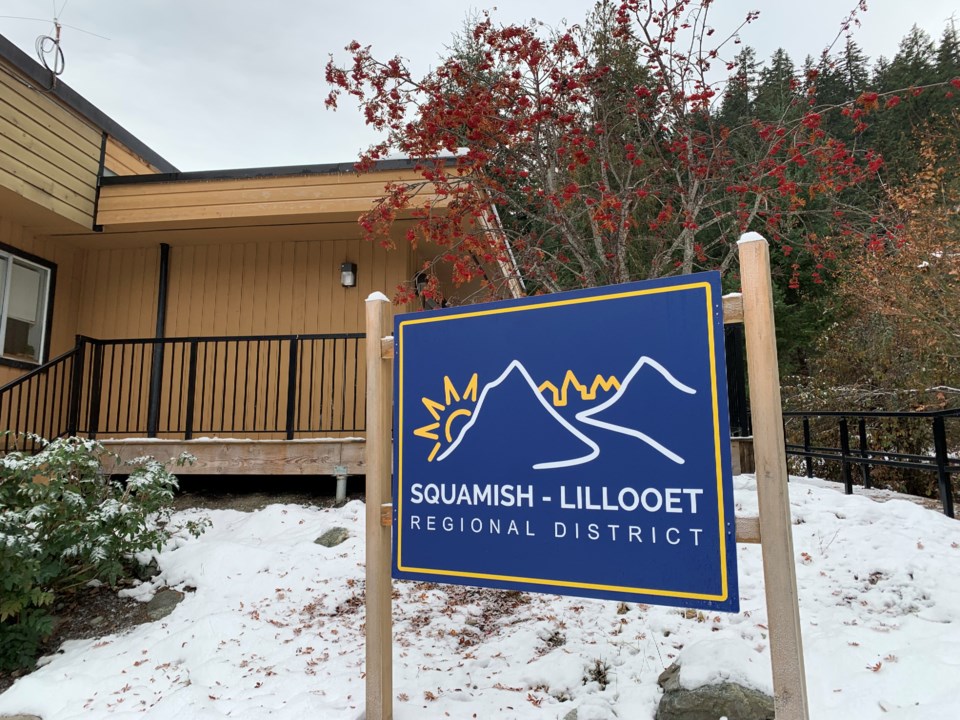The Squamish-Lillooet Regional District (SLRD) has adopted its budget for the year, with significant increases in spending intended to meet the needs of a fast-growing region.
Approved and adopted at the March 27 board meeting after months of staff work, tinkering, and committee feedback, the 2024-28 financial plan includes “substantive percentage increases” in line-item spending that was ultimately a worthwhile investment, said Squamish Councillor Jenna Stoner.
“On a per-cent-per-100,000 assessment, it doesn’t work out to be all that much, and I think they’re really important investments we’ve chosen to make as a board over time, and making sure that this organization is more resilient and robust to the changing conditions and the growing demands that we are asked of our communities,” she said.
Rate increases are difficult to calculate in the SLRD, as each property pays different rates depending on what services they are required to contribute towards. For that reason, the SLRD budget is presented on a per-service basis. For example, only D’Arcy residents contribute towards water services there, while only Paradise Valley residents contribute towards road clearing there.
Squamish Councillor Chris Pettingill also noted the growing demands on the SLRD by its constituents, adding that he wondered whether they had underspent in emergency planning given the last few years.
The 2024 budget for emergency planning is $2,777,658, compared to $2,314,560 in 2023, a 20-per-cent increase. (An SLRD communications official later clarified the increase is in operating expenses, "but there is no increase to taxation for this service in 2025; in fact it is a decrease to the taxpayers due to assessment growth").
According to a SLRD communications official, the difference is in part due to an increase in expenses caused by the 2023 wildfire season, which saw significant fires burning in the area that drew down heavily on district resources.
“The placeholder amount for Emergency Management BC Tasks (Emegency Operations Centre Expenses) was increased from $200k in 2023 to $800k in 2024, which resulted in a $600k increase in operating expenses,” the SLRD explained by email. “However, since the province fully reimburses these expenses, EMBC revenue was also increased to offset these expenses, which has no impact on the tax requisition amount for 2024. This was done to bring the amount in line with the actual expenditures we incurred in 2023, totalling $827k.”
Fire protection typically soaks up a few large numbers across the budget documents, and it was the same for 2024—with $2,394,997.50 for Howe Sound East Fire Services; as well as $35,509 for Pemberton Meadows Fire Protection; $64,001 for Pemberton Heights Fire Protection; $73,089 for Birken; $57,931 for WedgeWoods Estates; $28,998 for Gun Lake; $266,743 for Seton-Shalalth; $307,931 for Garibaldi; and $40,558 for Bralorne. The funds are raised mostly through requisitions (funds raised through property tax and vended out to municipalities), grants, and parcel taxes, with the makeup of funding sources different for every division.
All of the above figures represent total expenses and not taxation amounts, an SLRD official clarified. "For example: Seton Fire at $266,743 expenses, the taxed amount is only $20,906 for 2025 as other sources of funding are being used."
The full SLRD budget documents can be read on the SLRD website, covering requisitions and a fulsome five-year financial plan and forecasted expenses.






